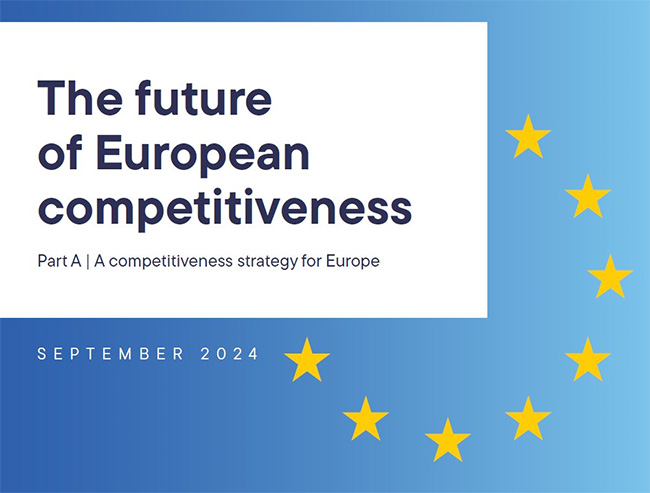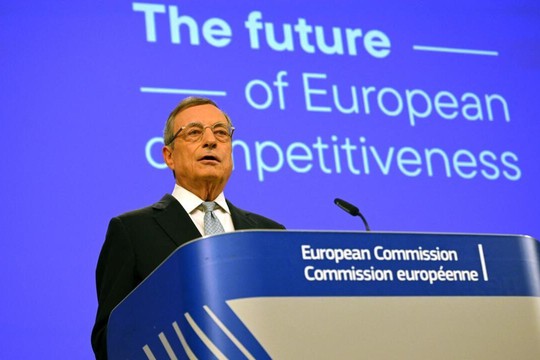Former European Central Bank President Mario Draghi
Photo: France24
Former European Central Bank President Mario Draghi called on the EU to invest as much as €800 billion ($884 billion) extra a year and commit to the regular issuance of common bonds to make the bloc more competitive with China and the US.
In his long-awaited report ‘The Future of European Union competitiveness’, Draghi urged the bloc to develop its advanced technologies, create a plan to meet its climate targets and boost defense and security of critical raw materials, labeling the task “an existential challenge,” Bloomberg reports.

Draghi said that Europe will need to boost investment by about 5 percentage points of the bloc’s GDP — a level not seen in more than 50 years — in order to transform its economy so that it can remain competitive. He warned that EU economic growth was “persistently slower” than in the US, calling into question the bloc’s ability to digitalize and decarbonize the economy quickly enough to be able to rival its competitors to the east and west.
“For the first time since the Cold War we must genuinely fear for our self-preservation,” Draghi told reporters in Brussels Monday. “And the reason for a unified response has never been so compelling and I am confident that in our unity we will find the strength to reform.”
Implementing the report’s most ambitious proposals, such as more joint debt, will face significant push back from countries including Germany and the Netherlands, that are strongly opposed to deeper fiscal integration. What’s more, most of the largest EU countries are contending with difficult domestic political situations that could give them limited room to maneuver.
The report comes as European leaders are increasingly aware of the loss of competitiveness against the bloc’s main rivals, partly due to Europe’s energy dependency and lack of raw materials. Meanwhile the EU continues to be hampered by the inability of its telecom and defense industries to harness economies of scale and be better prepared for a more nimble security stance.
Draghi pitched a rewriting of the bloc’s competition policy rulebook so that more money can be pumped into Europe’s key industrial sectors, and pressed regulators to adopt a more creative approach to vetting mergers — which could lead to the approval of more high-profile deals. He called for the EU’s merger watchdogs to take into account the pro-innovative effects of certain deals, which could offset any negative risks to competition.
Draghi also gave a boon to the telecom sector, in pressing for greater consolidation across Europe to plug gaps in the bloc’s prized single market.
Draghi’s report notes that EU economic growth has been persistently slower than in the US over the past two decades, driven by smaller advances in productivity. Germany has emerged as a particular weak spot as its industrial sector continues to struggle with high energy costs and a loss of competitiveness to China. Gross domestic product in the euro zone’s biggest economy is barely higher than before the pandemic.
Draghi laid bare the challenges facing EU industry as it embarks on its mission to reach net zero by the middle of the century. Energy prices in the region are too high and are holding back investments, while the bloc’s climate goals are placing a heavy short-term burden on the highest-emitting sectors. China and the US do not face such obstacles, while the level of finance they provide to the sector dwarfs that of the EU.
To make the energy transition an opportunity, Europe needs to sync all its policies with climate goals and come up with a joint plan for decarbonization and competitiveness that would span energy producers, clean tech and automotive sectors as well as energy-intensive companies where emissions are hard to abate.
The four largest emission-intensive industries in the EU, such as chemicals and metals, will require €500 billion over the next 15 years in order to decarbonize, Draghi’s report said. On top of that, transport investment needs will amount to €100 billion every year between 2031 and 2050.
Draghi drew on the automotive sector for particular scorn, calling it a “key example of a lack of EU planning.” The bloc faces a real risk that EU carmakers continue to lose market share to China, which has is ahead of the 27-member bloc in “virtually all domains,” while producing at a lower cost.
To address the growing digital innovation divide between the EU and the US and China, the report proposed reforming an agency to be modeled after the US Defense Advanced Research Projects Agency, which would finance breakthrough technologies and be managed by innovators rather than civil servants.
The European Investment Bank should also be allowed to co-invest in promising tech companies in order to encourage more venture capital to flow to businesses.
The report suggests common funding for defense R&D in a number of sectors such as drones, hypersonic missiles, directed-energy weapons, defense artificial intelligence and seabed and space warfare, but also the space sector. He also recommends ramping up collaborative procurement on defense equipment as well as favoring European companies, provided they are competitive.
“If Europe cannot become more productive, we will be forced to choose. We will not be able to become, at once, a leader in new technologies, a beacon of climate responsibility and an independent player on the world stage,” Draghi wrote in the report. “We will have to scale back some, if not all, of our ambitions.”
read more in our Telegram-channel https://t.me/The_International_Affairs

 11:33 11.09.2024 •
11:33 11.09.2024 •























